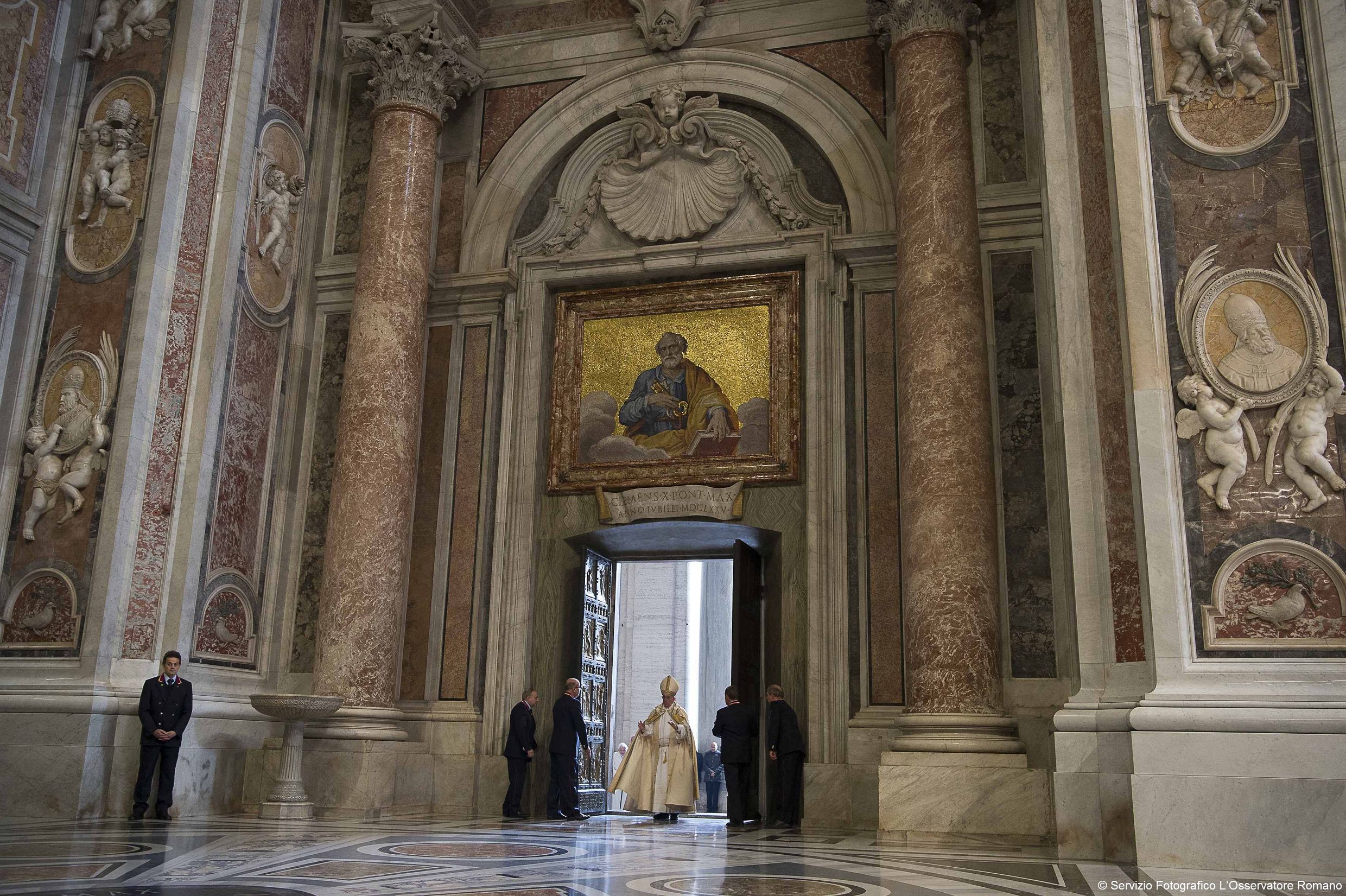Holy Year
At 11.10 Pope Francis crossed the threshold of the Holy Door, followed by Pope Emeritus Benedict XVI, whom he had fraternally embraced shortly before. The Feast of the Immaculate Conception stands as a paradigm for the Jubilee Year. “We are not afraid”, the Pope repeated in the Jubilee celebrated at the time of ISIS.

An embrace and three Doors: this image exemplifies a day that has already passed down in history. Pope Francis had opened his first Jubilee – the first “decentralized” Jubilee worldwide, the first one dedicated to the theme of mercy, precisely 50 years after the closing of the Second Vatican Council – begun with a fraternal embrace with his predecessor, who at the end of the Angelus prayer asked to greet no less than 70 thousand people gathered in St. Peter’s Square, despite terror alerts and rainfalls in Rome since the early morning hours. The Holy Door of the Vatican basilica – from today the Door of Mercy – opened at 11.10. Francis pushed with his own hands the preciously carved doors several times, after having climbed up the steps. When the door finally opened, Francis prayed silently on the threshold. He was the first to walk through, followed by the concelebrants and by several representatives of priests, religious men and women, and lay faithful. After him, the second pilgrim who crossed the Door of Mercy was Benedict XVI. A long procession advanced along the central nave until the Altar of Confession, where the final rite of the Mass was celebrated. Pope Francis mentioned the two other doors in his homily: “As I did in Bangui”, he said referring to the ensuing gesture. He then referred to the Council, from which were read out excerpts drawn from the Declarations and Decrees before the beginning of the rite. Precisely 50 years later, the Pope recalled “another door”, the one that was opened by the Council Fathers.
“The Council was a genuine encounter between the Church and the men and women of our time”.
Yesterday like today the Church must “emerge from the shoals which for years had kept her self-enclosed so as to set out once again, with enthusiasm, on her missionary journey”. In the cities, in homes, in workplaces, “wherever there are people, the Church is called to reach out to them and to bring the joy of the Gospel, and the mercy and forgiveness of God”.
“This is the door of God. Open the doors of justice. Through your great mercy I will enter your house, Lord”. With these words Pope Francis pushed open the Holy Door that he walked through as first pilgrim of the Jubilee year, repeating the gesture made on November 29 in the cathedral of Bangui. “May it be a year of mercy”: his prayer for the Jubilee..
“We have to put mercy before judgment, and in any event God’s judgement will always be in the light of his mercy”, is the main appeal of the homily centered on the correspondence between the Solemnity of the Immaculate Conception and the deep meaning of the Holy Year: “it reminds us that in our lives, everything is a gift, everything is mercy” “that is the key-word of the Gospel”. “You cannot conceive of a true Christian who is not merciful, just as you cannot conceive of God without His mercy”.
“We are not afraid”, the Pope said in the homily and at the end of the Angelus prayer, re-evoking directly Saint John Paul II, as in the words spoken before opening the Holy Door, that called to mind the Holy Year of the Year 2000: “it’s the Door”. In his homily, the Pope said: “Let us set aside all fear and dread, for these do not befit men and women who are loved. Instead, let us experience the joy of encountering that grace which transforms all things”. At the Angelus, he added impromptu: “we should not be afraid: we should allow ourselves to be embraced by the mercy of God, who waits for us and forgives everything. Nothing is sweeter than His mercy, let us allow ourselves to feel God’s caress, the Lord is so good and he forgives everything!” Francis drew from his daily experience, as when, in his homily, he spoke of being “tempted to disobedience, a disobedience expressed in wanting to go about our lives without regard for God’s will”. Instead, to pass through the Holy Door “means to rediscover the infinite mercy of the Father who welcomes everyone and goes out personally to encounter each of them”. “He looks for us, He comes towards us”, he added extempore. Or when he depicted the image of Mary, “mother of a new humanity, dawn of the new creation realized by the divine mercy”. To celebrate the Jubilee, Francis said, entails two things: “fully accepting God and His merciful grace in our life” and “becoming, in our turn, builders of mercy through a genuine evangelic path”.
“The feast of the Immaculate becomes the feast of us all, with our daily “yes”, we manage to overcome our selfishness and make happier the lives of our brothers, to give them hope, wiping a few tears and giving a little joy.
Thus our face will resemble in some ways the face of Christ: “the face we recognize when He goes out towards everyone, heals the sick, when he sits at the same table with sinners, and especially when, nailed to the cross, He forgives”.